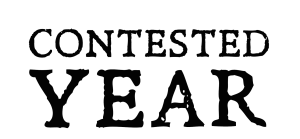
In his review of James Shapiro’s 1606: Shakespeare’s Year of Lear (Simon & Schuster, 2015) published this month in the Cambridge Quarterly, David Ellis, PhD, disputes Shapiro’s thesis that historical background can substitute for biographical foreground.
Ellis begins his analysis — titled “Another Year in the Life of Shakespeare” — by relating Shapiro’s new book to his extravagantly popular work 1599: A Year in the Life of William Shakespeare (Harper Collins, 2005):
[Year of Lear] is the successor to Shapiro’s highly acclaimed 1599, published ten years ago and welcomed by Jonathan Bate as ‘one of the few genuinely original biographies of Shakespeare’. Concentrating on a single year was certainly an innovation, but there was nothing original about the methods Shapiro employed. In his Shakespeare’s Lives, Samuel Schoenbaum identified the Victorian biographer Charles Knight as the first person properly to ‘associate Shakespeare with the circumstances around him’ and thus triumph over ‘the limitations of his data’. What this method chiefly means, in Shapiro’s case, is making historical background stand in for a biographical foreground which is absent because the information directly related to Shakespeare’s life is still so desperately meagre. How could it not be when not a single letter he wrote survives; almost all the fifty or so references to him by contemporaries which E. K. Chambers collected together are, from a biographical point of view, worthless; and the last biographically significant archival discovery dates back to 1910? What Shapiro tried to do was relate the major historical events of 1599 to what little we know of Shakespeare’s life, but that proved so difficult that it seemed to me his subtitle, ‘A Year in the Life of William Shakespeare’, became misleading, suggesting as it did that we actually know what was happening to the playwright in the spring, summer, autumn, or winter of that year.
Later Ellis says:
The subtitle of Shapiro’s new book [Shakespeare in 1606] is more cautious [than 1599: A Year in the Life of William Shakespeare] and there appear throughout it confessions as to our complete ignorance of Shakespeare’s circumstances and feelings in situations where they would really matter. . . . yet, many of the old habits still persist, with liberal scatterings of ‘might’ or ‘would have’ and occasional recourse to the argument from silence. Thus we are old Shakespeare preferred (italics) ‘to remain in the shadows’, so that our ignorance of his life then becomes his own responsibility . . .
In his distaste for biographies featuring what might have or would have occurred, Ellis mirrors Germaine Greer’s concern as reported in her Oct. 6, 2015 Year of Lear review “Nowhere man: the challenges of tracking down Shakespeare” in The New Statesman: “For any writer of an extended narrative the temptation to abandon the conditional for the indicative is almost irresistible and Shapiro has not resisted it,” Greer said.
Ellis — emeritus professor of English literature at the University of Kent in Canterbury — expressed his concern about the limits of Shakespearean biography in his 2012 book The Truth About William Shakespeare: Fact, Fiction and Modern Biographies published by Edinburgh University Press. According to the Amazon book blurb:
How can biographies of Shakespeare continue to appear when so little is known about him? And when what is known has been in the public domain for so long? Why have the majority of the biographies published in the last decade been written by distinguished Shakespeareans who ought to know better? To solve this puzzle, David Ellis looks at the methods that Shakespeare’s biographers have used to hide their lack of knowledge.
When we asked Ann Newton, managing editor of Cambridge Quarterly about their choice of Ellis to review Shapiro, she declined to comment; so we rely on the description of the journal provided on their website:
The Cambridge Quarterly is a journal of literary criticism which also publishes articles on cinema, the visual arts, and music. It aims, without sacrifice of scholarly standards, to engage readers outside as well as inside the academic profession. It welcomes articles that encourage the re-reading of familiar authors, as well as those that champion new or neglected work. The journal remains committed to the re-appraisal of accepted views, and the principle that criticism and scholarship should reinforce the pleasure for which literature and other works of arts are created.

You must be logged in to post a comment.